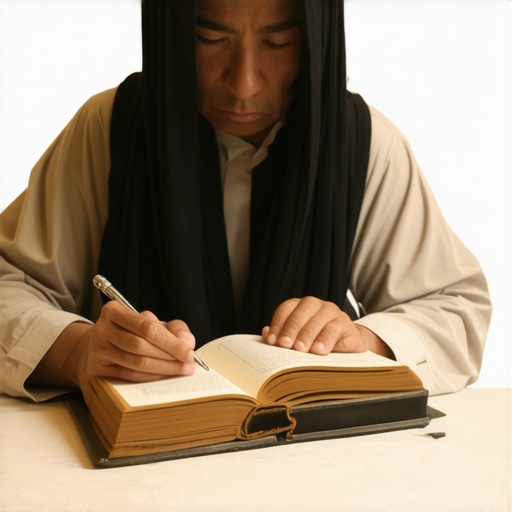My Journey into Understanding Dreams in Islam
As someone deeply interested in spiritual growth and Islamic teachings, I remember a vivid dream I had early one morning that left me pondering its meaning for days. It was a night filled with symbols and messages that seemed to whisper divine secrets. This experience sparked my curiosity about how to interpret dreams in Islam and recognize the divine messages Allah might be sending through our subconscious.
Unveiling the Spiritual Significance of Dreams
In Islamic tradition, dreams are often viewed as a form of divine communication. I learned that the Prophet Muhammad (peace be upon him) emphasized the importance of dreams and their interpretations, especially for guidance and understanding divine signs. This aligns with my personal experience where a dream about a flowing river symbolized spiritual renewal and divine blessings, which I later found detailed in Islamic dream dictionaries like river in Islam dreams.
How to Recognize Genuine Divine Messages
One question I often ask myself is: “How can I tell if a dream is truly a message from Allah?” From my studies and experiences, I realized that genuine divine dreams often come with a sense of peace and clarity. They might also be accompanied by feelings of reassurance or guidance, unlike ordinary dreams which can sometimes be confusing or ambiguous. Additionally, I found that dreams from Shaytan tend to be disturbing or unsettling, so seeking refuge and praying for clarity is essential.
What are the signs that a dream is a divine message in Islam?
According to Islamic scholars, genuine dreams often contain symbols that align with Islamic teachings and morality. Recognizing these symbols, such as seeing the Kaaba or reciting Quran, can help discern their divine origin. For instance, dreaming of the Prophet Musa (Moses) can carry profound spiritual messages, as explained in dreams of Prophet Musa. Trusting your intuition and consulting knowledgeable scholars can also be invaluable in interpreting these dreams accurately.
Practical Steps to Interpret Dreams in Islam
Over time, I developed a simple yet effective approach: keep a dream journal, seek knowledge from authentic sources, and pray for guidance. I also learned that understanding the context of your life and current challenges can shed light on the meaning of your dreams. Engaging with Islamic dream dictionaries and consulting trusted scholars can deepen your understanding, much like exploring dreams about losing teeth or wealth and prosperity dreams.
If you’re like me, eager to recognize divine messages, remember that sincerity, patience, and prayer are your best tools. And don’t hesitate to share your experiences or seek guidance from knowledgeable sources—our collective journey in understanding dreams in Islam can be truly enlightening.
Feel free to comment below with your personal stories or questions about interpreting dreams in Islam. Exploring these divine messages together enriches our spiritual path.
Unlocking the Hidden Symbols in Islamic Dreams
As an experienced scholar in Islamic dream interpretation, I often emphasize the importance of understanding the nuanced symbolism present in our dreams. Islamic tradition holds that dreams can serve as a bridge between the divine and the mortal realm, conveying messages that require careful analysis. For example, dreaming of water may symbolize purity, spiritual cleansing, or divine sustenance, but the context and personal circumstances are crucial in interpretation. To deepen your understanding, consider exploring river dreams in Islam, which offers detailed insights into water symbolism and its prophetic significance.
How can one distinguish between a true divine dream and others?
Distinguishing genuine divine dreams involves examining the feelings they evoke and their consistency with Islamic teachings. Authentic dreams often come with a sense of tranquility, clarity, and reassurance, whereas deceptive dreams might induce confusion or fear. It is also advised to seek refuge from Shaytan by reciting A’udhu billahi min ash-shaytanir rajim and praying for clarity. Consulting knowledgeable scholars can further aid in verifying the dream’s authenticity, especially when symbols like the Kaaba or Prophets appear, which are powerful indicators of divine messages. Recognizing these signs requires a combination of spiritual intuition and learned knowledge, emphasizing the importance of ongoing Islamic education and prayerful reflection.
Practical Techniques for Accurate Dream Interpretation
Developing a reliable method for interpreting dreams involves multiple steps. Firstly, maintaining a detailed dream journal helps identify recurring symbols and themes. Secondly, studying trusted Islamic dream dictionaries, such as Ibn Sirin’s dream dictionary, provides valuable contextual meanings grounded in Islamic tradition. Thirdly, engaging in reciting Quran in dreams can illuminate divine messages. Additionally, contextualizing the dream within one’s current life circumstances enhances accuracy, whether in relation to health, relationships, or spiritual progress. For example, dreaming of a mountain can symbolize strength and resilience, but understanding your personal challenges is key to precise interpretation. Always approach dreams with sincerity, patience, and prayer, as these are fundamental tools in unveiling their true meanings.

Image prompt: An Islamic scholar studying dream symbols with Quran and dream journal, illustrating the process of Islamic dream interpretation.
What are the common pitfalls in interpreting dreams without proper knowledge?
Without proper understanding, misinterpretation of dreams can lead to unnecessary anxiety or misguided actions. A prevalent mistake is attributing every vivid or emotional dream as a divine message, which can distort one’s spiritual outlook. Some may also rely solely on personal intuition, ignoring the rich symbolism and context provided by authentic sources. This underscores the importance of consulting qualified scholars and utilizing well-established Islamic dream dictionaries. Furthermore, misinterpreting symbols like animals or colors—such as assuming a snake always signifies evil—can be misleading unless weighed within the specific context and symbolism recognized in Islamic tradition. To avoid these pitfalls, continuous learning and humility are essential, along with seeking Allah’s guidance through prayer and supplication during the interpretative process.
If you’re eager to refine your understanding, I encourage you to share your experiences or questions about dreams in the comments. Engaging with a community of knowledgeable believers not only enriches your insights but also helps foster a deeper connection with divine guidance.
The Nuances of Recognizing Divine Dreams in Our Complex Lives
As I delved further into the realm of Islamic dream interpretation, I realized that discerning genuine divine messages requires not only knowledge but also a nuanced understanding of our personal and spiritual contexts. Dreams often reflect our subconscious, but when it comes to divine messages, the layers become more intricate. I recall a dream where I saw myself reciting Quran beside a flowing river, which initially seemed straightforward. However, upon reflection and consultation with a knowledgeable scholar, I understood that the river symbolized spiritual renewal—an affirmation of ongoing spiritual efforts. This experience reinforced that recognizing true divine dreams often involves patience, prayer, and a deep connection to our inner selves.
Advanced Symbols and Their Hidden Meanings in Islamic Dreams
Over time, I encountered symbols that initially appeared simple but revealed profound meanings upon closer inspection. For instance, dreaming of a snake is common, but the context and the snake’s behavior determine its significance. According to Islamic perspectives on snakes in dreams, a snake can symbolize both danger and spiritual transformation. Recognizing these symbols involves understanding their multifaceted nature, which is why I emphasize studying authentic sources and consulting scholars. These symbols often serve as spiritual wake-up calls, urging us to reflect on our actions and moral commitments.
How Do Advanced Dream Symbols Reflect Our Spiritual Growth?
In my personal journey, I found that recurring symbols—like mountains, water, or animals—signify ongoing spiritual challenges and growth. For example, dreaming of climbing a mountain repeatedly signified resilience and the importance of steadfastness in faith. Such dreams encourage us to persevere through difficulties, trusting that divine guidance is with us. Moreover, interpreting these symbols requires a holistic approach—considering current life circumstances, emotional states, and spiritual aspirations. This aligns with the idea that dreams are not only messages but also reflections of our inner spiritual evolution, a concept supported by scholars like Al Nabulsi, who emphasized the importance of patience and sincerity in dream interpretation here.
Practicing Deep Reflection and Continuous Learning
Engaging in regular reflection and seeking knowledge are crucial. I keep a dream journal, not merely to record symbols but to analyze patterns over time. This practice, combined with recitation of Quran and supplication, deepens my understanding and helps me recognize divine signs more clearly. I also find that studying diverse sources—like Ibn Sirin’s dream dictionary and contemporary Islamic scholars—expands my perspective. For those eager to deepen their knowledge, I recommend exploring Ibn Sirin’s dream dictionary as a foundational resource. Remember, the pursuit of understanding dreams in Islam is a lifelong journey that intertwines knowledge, sincerity, and patience.
Inviting Personal Stories and Shared Wisdom
I invite you, dear reader, to share your own experiences with divine dreams or questions about interpreting symbols. Personal stories often reveal the profound ways Allah communicates with us through dreams, guiding our spiritual paths. Engaging with a community of believers enhances our collective understanding and fosters humility—recognizing that every interpretation is a step towards greater closeness to Allah. If you wish to explore more about protecting yourself from misleading dreams or seeking divine guidance, consider reading about protective Sunnah practices.
May Allah bless your journey in understanding the sacred language of dreams, and may your reflections lead you closer to divine wisdom and peace.
Unlocking the Layers of Divine Symbols in Our Dreams
As I have journeyed deeper into the art of Islamic dream interpretation, I have come to realize that many symbols we encounter are multifaceted, requiring a nuanced understanding that goes beyond surface-level meanings. For instance, dreaming of a river might symbolize spiritual sustenance, purification, or divine mercy, but its significance varies dramatically depending on context, emotional tone, and personal circumstances. This layered symbolism is akin to unlocking a divine code, where each symbol holds potential insight into our spiritual state and divine messages.
How Can We Discern Authentic Divine Symbols Amidst Personal and Cultural Filters?
Distinguishing authentic divine symbols from personal or cultural imprints demands a combination of sincerity, knowledge, and spiritual sensitivity. Genuine signs often resonate with Islamic principles, such as encountering the Kaaba or Prophets, and evoke tranquility rather than fear or confusion. Consulting reputable scholars and authentic sources like Al Nabulsi’s teachings can help validate these symbols. Moreover, cultivating humility and patience in interpretation ensures we do not project our biases onto divine messages, preserving their sanctity and accuracy.
What are the signs that a dream symbol carries a deep prophetic message rather than a subconscious reflection?
Prophetic dream symbols often appear during moments of spiritual elevation or heightened awareness, accompanied by an unmistakable sense of guidance and inner peace. These symbols frequently align with Quranic themes or prophetic traditions, reinforcing their divine origin. For example, dreaming of losing teeth may symbolize the loss of worldly attachments and the awakening to spiritual realities, especially if it occurs during prayer or contemplation. Recognizing such signs involves a deep connection to one’s faith, continuous spiritual practice, and consultation with knowledgeable scholars who can interpret these divine indicators accurately.
Advanced Techniques for Deep Dream Interpretation in Islam
My personal approach to unraveling complex dreams incorporates several advanced techniques. Firstly, I keep a meticulous dream journal to track recurring symbols and themes, which often reveal profound spiritual messages over time. Secondly, I dedicate time to reciting Quran and engaging in supplication, seeking divine guidance in my interpretive process. Thirdly, I analyze the context of my life—current challenges, spiritual goals, and emotional states—to understand the messages more holistically. This integrative method aligns with the teachings of scholars like Al Nabulsi, who emphasize that sincerity combined with knowledge unlocks the deepest layers of divine messages.
To deepen your understanding, I recommend exploring Ibn Sirin’s dream dictionary. Remember, the pursuit of accurate dream interpretation is a lifelong journey that demands humility, patience, and a sincere heart committed to seeking Allah’s guidance in all aspects of life.
Engage and Share Your Experiences
I invite you, dear reader, to share your own encounters with divine symbols or ask questions about complex dream meanings. Our collective reflections strengthen our spiritual bonds and enhance our ability to decipher divine signs with wisdom and humility. If you wish to fortify yourself against misleading dreams, consider exploring Sunnah practices for spiritual protection. Your stories and insights could illuminate others’ paths, fostering a community rooted in authentic Islamic understanding and divine trust.
May Allah bless your journey in unraveling the sacred language of dreams, guiding you toward greater spiritual insight and divine closeness.
Things I Wish I Knew Earlier about Islamic Dream Interpretation
Trust Your Intuition but Seek Knowledge
When I first started exploring dreams in Islam, I often relied solely on my gut feeling. Over time, I realized that combining intuition with authentic knowledge from Islamic sources deepens understanding and prevents misinterpretation. Remember, dreams can be divine messages or just reflections of our subconscious, so approach them with humility.
The Symbols Are Not Always What They Seem
Initially, I thought dreaming of water always signified purity. But I learned that context matters—water can also symbolize challenges or divine sustenance depending on the situation. Studying detailed dream interpretations, like those in Islamic dream dictionaries, helps decode these symbols more accurately.
Reciting Quran Enhances Dream Clarity
One personal tip I wish I knew earlier: reciting Quran before sleep can invite divine guidance and clarity in dreams. It’s a simple practice that opens a channel to receive meaningful messages aligned with Islamic teachings.
The Importance of Dream Journals
Keeping a dream journal has been invaluable. Writing down dreams immediately upon waking helps identify recurring symbols and themes, leading to better understanding over time. It’s a spiritual practice that fosters patience and reflection.
Patience Is Key
Sometimes, the true meaning of a dream reveals itself only after days or weeks. Patience and continuous prayer are essential. I learned not to rush interpretations but to seek Allah’s guidance sincerely.
Community and Scholars Are Your Allies
Sharing dreams with knowledgeable scholars or trusted community members can provide new insights. Never hesitate to ask for help—our collective knowledge enriches our spiritual journey.
Resources I’ve Come to Trust Over Time
- Islamic Dream Dictionary by Ibn Sirin: This classic resource offers profound insights rooted in Islamic tradition. I often refer to it for symbol meanings and common dream themes.
- Al Nabulsi’s Dream Interpretation: His teachings emphasize sincerity and patience, guiding me to interpret dreams with humility and faith.
- IslamQA.com: A reliable online platform where scholars answer specific questions about dreams and Islamic practices. It’s been helpful for clarifying complex issues.
- Reciting Quran in Dreams: Practicing Quran recitation before sleep has helped me receive clearer divine messages. It’s a spiritual practice I highly recommend.
Parting Thoughts from My Perspective
Dreams in Islam are a fascinating and profound aspect of our spiritual life. They can serve as signs, guidance, or tests from Allah. From my experience, approaching dreams with sincerity, patience, and knowledge transforms them from confusing images into meaningful divine messages. I encourage you to keep a journal, seek authentic sources, and pray for clarity. Remember, every dream is an opportunity to grow closer to Allah and deepen your understanding of His divine wisdom.
If this resonated with you, I’d love to hear your thoughts or personal experiences. Sharing our journeys can inspire others and enrich our collective understanding of dreams in Islam.




This comprehensive post really resonated with me. I’ve noticed that focusing on the emotions I feel during my dreams often helps me distinguish divine messages from ordinary ones. For instance, when I wake up feeling peaceful after a dream, I tend to believe it holds guidance from Allah, especially when the symbols align with Islamic teachings. I also keep a dream journal, which has helped me detect recurring themes like water and mountains, signifying spiritual growth. One challenge I face is understanding the cultural nuances behind certain symbols, which can sometimes conflict with Islamic symbolism. Have others found specific resources or scholars that help clarify these cultural influences? I think ongoing knowledge and sincere prayer are vital as we deepen our understanding of dream interpretation. Any tips on sharpening intuition while maintaining humility in this spiritual practice? Would love to hear from others about their experiences and insights.
What a beautifully articulated post. I’ve also started keeping a dream journal, and I agree that patience plays a vital role in understanding divine messages in dreams. Sometimes, I find myself overwhelmed with symbols—like water, trees, or animals—and struggle to interpret them accurately. I’ve recently come across a scholar named Sheikh Yasir Qadhi who emphasizes that context, both spiritual and personal, is essential in decoding these signs. I was wondering if others have tried seeking guidance directly from scholars about their dreams? I believe that combining sincere supplication with continuous learning helps us develop sharper spiritual intuition, but I’d love to hear specific practices that others find effective in maintaining humility while deepening their understanding. Also, how do you protect yourself against misleading dreams especially when vivid images leave doubt? Sharing experiences and different approaches will definitely enrich our collective journey in deciphering divine messages. JazakAllah khair for this enlightening discussion.
This post truly highlights the delicate balance needed when interpreting dreams in Islam. I’ve personally experienced dreams that initially felt personal but later revealed profound divine messages after reflection and consultation with knowledgeable scholars. A challenge I often face is maintaining humility while trusting my intuition—sometimes I get overly excited or doubtful, which can cloud my judgment. I found that regular prayer and reciting Quran before sleep help establish a spiritual calm and clearer insight. Something I’d like to ask the community: how do you differentiate between dreams that are truly from Allah and those that may be from Shaytan, especially when vivid images evoke strong emotions? I agree that keeping a dream journal and seeking expert advice are invaluable, but I’d also be interested in practical daily routines or dua that others use for spiritual cleansing and clarity. Overall, this journey requires patience and sincere effort, and I’m thankful for this reminder to seek knowledge and divine guidance.